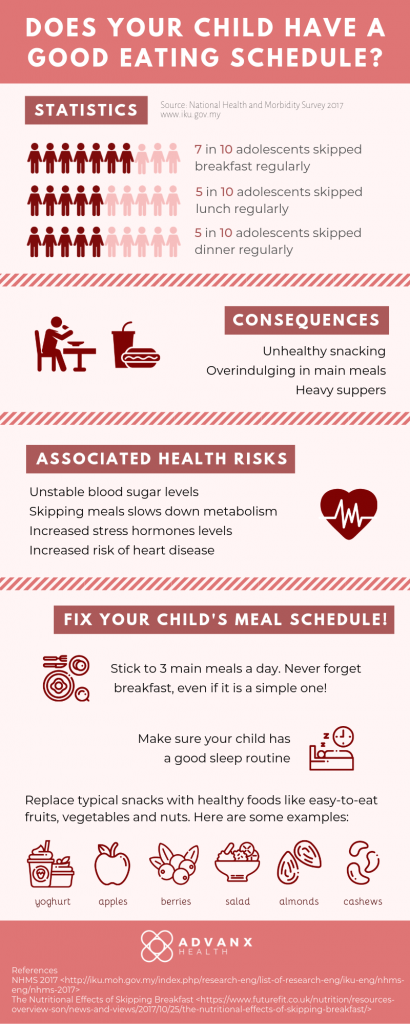Getting your kids to eat their vegetables may be a constant battle that you have, but it’s definitely a battle worth fighting.
Did you know that a recent survey (NHMS 2017) showed that many adolescents have poor dietary habits in Malaysia?
As parents, what can you do to help your children improve their diet and nutrition? Read on to learn more.

Meal skipping – is it okay?
Of course not! One of the main poor dietary practices among adolescents has to be irregular meal schedules. In fact, the survey found that 31% of adolescents do not eat main meals in a day!
It is obvious that this could be due to their busy daily schedules – early school hours, heavy academic workload and lots of extracurricular activities. However, these should not be the reasons to sacrifice their health.
Fix the love-hate-relationship with snacking
The most detrimental consequence of skipping meals is probably unhealthy snacking. Most of the snacks are processed food, so they are high in fats and sugars, and have a relatively low nutrient content.
Substituting main meals with snacks will significantly increase their calorie intake. But without getting much of the nutrients needed for good health. If your child can’t resist from having quick bites/snacks during non-meal times, do try replacing their snacks into healthier options as mentioned in the infographic.
Break-fast: More important than you think
So, is your child one of the 7 out of 10 who doesn’t take breakfast seriously?
Those who do not have appetite for breakfast could try at least filling their stomachs with some biscuits to break your fast after a whole night’s sleep (yes, that is exactly what the word breakfast means).
A decent breakfast is important to keep our metabolism and blood sugar at a level that helps us perform at our best throughout the day.
To all the parents out there, do start paying more attention to your child’s meal times. Having a regular meal schedule is more than for their health’s sake – it also helps in building their self-discipline and living a more routinely life. It is never too late to fix these habits as it may affect them for life!
References
National Health and Morbidity Survey 2017: Adolescent Health and Nutrition Survey, Institute of Public Health http://iku.moh.gov.my/images/IKU/Document/REPORT/NHMS2017/NHMS2017Infographic.pdf

